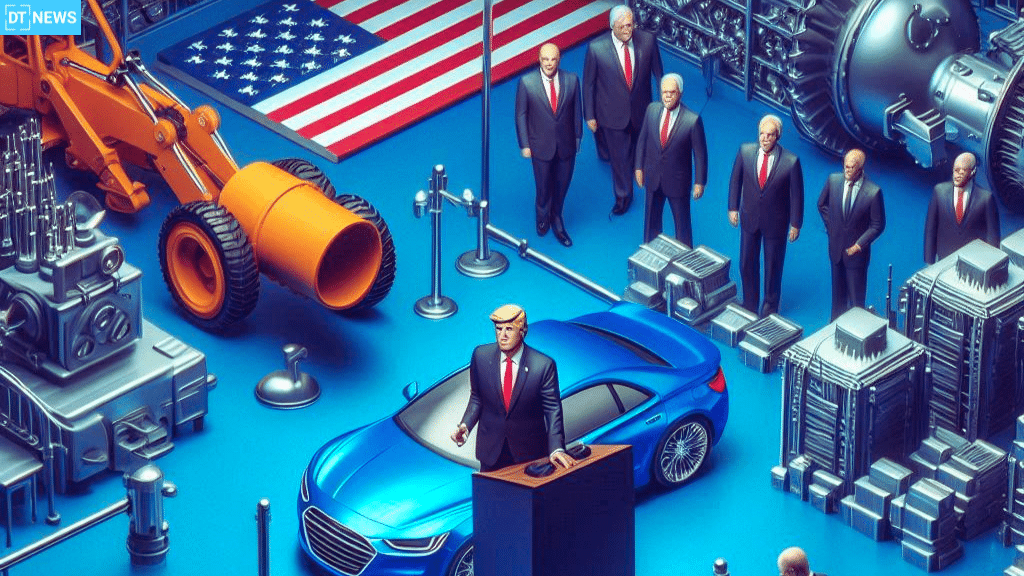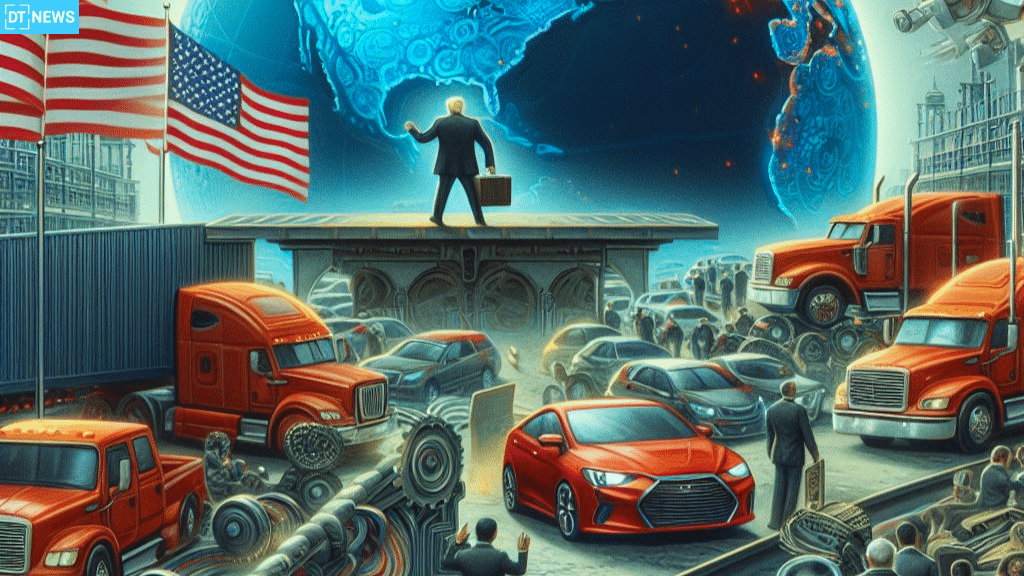 CaryptosHeadlines Media Has Launched Its Native Token CHT.
Airdrop Is Live For Everyone, Claim Instant 5000 CHT Tokens Worth Of $50 USDT.
Join the Airdrop at the official website,
CryptosHeadlinesToken.com
CaryptosHeadlines Media Has Launched Its Native Token CHT.
Airdrop Is Live For Everyone, Claim Instant 5000 CHT Tokens Worth Of $50 USDT.
Join the Airdrop at the official website,
CryptosHeadlinesToken.com
According to news sources, President Donald Trump has announced a 25% tariff on all non-US-made vehicles, a move that could change the auto industry forever. Effective April 3, the tariff will be on fully assembled foreign-made cars and key auto parts like engines, powertrains, and transmissions. The administration claims it will bring back manufacturing to the US, but critics say it will cause trade tensions, higher car prices, and disrupt the industry’s complex global supply chains.
During his Oval Office announcement, Trump said:
“We’re going to be putting a 25% tariff on all cars that are not made in the United States. This will be permanent.”
This big tariff increase builds on the existing 2.5% baseline duty on imported vehicles. Cars made in the US and auto parts compliant with the USMCA will be exempt from the new duty.
The announcement sent the markets into disarray, with auto stocks reportedly dropping due to concerns about the impact on supply chains and consumer prices.
Trump’s Reasoning: Strengthening US Manufacturing and Reducing Debt
President Trump has framed the tariff as part of his plan to reshape global trade and eliminate what he calls a “ridiculous” reliance on foreign supply chains. He says the tariff will encourage auto companies to expand in the US, reduce trade imbalances by discouraging foreign-made vehicles, help pay down the US national debt by making it a revenue source
“This is not just a tax,” Trump said. “This is about bringing jobs back to American soil and making sure the US does not depend on foreign manufacturing.”
Some Republican lawmakers and economists support the policy saying it will incentivize domestic investment and be a long term boost to American auto workers.


Global Reaction: Europe and Canada Push Back
The announcement has already drawn strong criticism from the European Union (EU) and Canada, both of which have deep auto ties with the US. European Commission President Ursula von der Leyen called the tariff decision “bad for business, worse for consumers” and said retaliatory measures could follow.
Canada’s Prime Minister Mark Carney reportedly said,
“We will not stand by as our auto industry is threatened by unjustified trade barriers.”
These comments suggest the tariff could escalate into a bigger trade war with countries imposing reciprocal tariffs on US exports.
Catalyst for Crypto Surge or Market Setback?
While Trump is announcing a 25% auto tariff on imported cars to restore U.S. manufacturing, this move is unlikely to have a clear-cut effect on the crypto market. On the one hand, increasing trade tensions could lead to an economic downturn, driving investment away from decentralized assets and towards decentralized ones like Bitcoin as a hedge. Conversely, higher tariffs could temporarily boost the U.S. dollar, causing a strain on risk-on assets like crypto. While this move isn’t directly crypto-related, its ripple effects on inflation, investor sentiment, and global markets could cause short-term volatility—making it a potential boom or bust moment, depending on how traders react.
US Auto Industry: A Double-Edged Sword?
While the tariff is meant to boost US based car production; many industry experts and analysts say it could hurt both manufacturers and consumers in several ways. The US imports millions of vehicles every year from companies like Toyota, BMW and Volkswagen. Tariffs would likely increase prices and make them less affordable for consumers.
The U.S. auto industry uses foreign parts, so the costs of building cars here could skyrocket. Stock prices of major automakers plummeted after the announcement, indicating investor worry.
While Trump’s administration says the tariff will create jobs, analysts say it could cost jobs if foreign companies cut U.S. investments in response.
Will the Tariff Backfire? Potential Economic Consequences
Economists warn the tariff could have unintended inflationary effects, since vehicle costs are a big chunk of consumer spending. If car prices go up, it could increase inflation, making it harder to control overall prices, it could reduce consumer spending, as higher costs mean lower demand; it could also hurt U.S. auto exports, as other countries retaliate with tariffs on American cars.


Trump was reelected in 2024 on the promise of lower costs for consumers, so this tariff is a political gamble that could backfire if prices go extremely high.
Conclusion: Bold Strategy or Economic Risk?
The 25% auto tariff is one of the most aggressive trade moves in Trump’s second term. While it’s meant to help domestic manufacturing, it comes with price hikes, trade wars, and supply chain disruptions.
Foreign leaders are already opposing the policy and automakers are bracing for the impact, so the next few months will be telling if this helps the U.S. economy or sparks a new trade war.
FAQs
What does Trump’s 25% auto tariff mean?
It’s a 25% tax ‘on all foreign cars imported into the U.S. to boost domestic car manufacturing.
When does the auto tariff take effect?
The tariff will go into effect April 3, 2025.
Will the tariff affect U.S.-built cars?
No. Cars built in the U.S. and auto parts that meet USMCA standards are exempt from the tariff.
How will this tariff affect car prices?
Imported cars will cost more, making ‘cars more expensive for consumers.
How have other countries responded?
The EU and ‘Canada have reportedly opposed the tariff and are threatening retaliatory trade measures against the U.S.
Glossary
Tariff: A tax on imported goods to make’ them more expensive, used to protect domestic industries.
USMCA (United States-Mexico-Canada Agreement): ‘Trade agreement that replaced NAFTA, governing economic relations between the three countries.
Supply Chain: Global system of suppliers, ‘manufacturers and distributors that produce goods.
Reciprocal Tariff: Trade policy where a country imposes tariffs on imports equal to those ‘applied to its exports.
Inflation: Rate at which the general price level of goods and services increases, reducing purchasing power.












